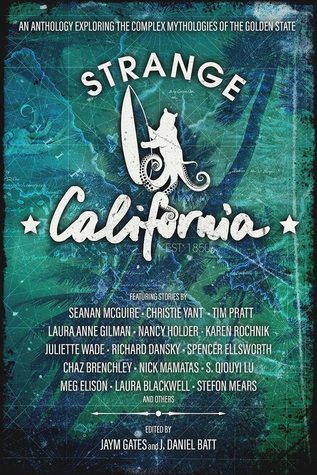Book Review: Strange California (anthology)

California is a big state, and occupies an even bigger place in our imaginations, so it’s only to be expected that a collection of stories exploring what makes it so special — so strange — makes for a big book. Which is to say, a promise of value, of bang for one’s buck, is made right up front. As is outlined in what amounts to a manifesto in the book’s introduction, the stories in Strange California explore not only the state’s varied physical and cultural geography, but also what makes it so very different from the rest of the United States — what makes it strange. As editors Jaym Gates and Daniel Batt emphasize in the introduction, however, this collection is not merely an anthology of weird fiction. California is certainly weird, but it’s also strange — set apart, unknown, perhaps unknowable to those of us who don’t live there, who are strangers to the place.
Book Review: An Alchemy of Masks and Mirrors by Curtis Craddock

In this first novel in his Risen Kingdoms series, Curtis Craddock is coming at us like the love child of Alexandre Dumas and Frank Herbert, possibly as fostered in his youth by Scott Lynch. It’s a helluva combination, and I don’t make a comparison like this lightly. If you’re a fan of any of those authors, or of intricately plotted fantasy that’s full of surprises, well, grab onto a restraining rope and climb aboard my airship. That’s right, I said airship. The fantasy world of the Risen Kingdoms is one of floating continents*, some thickly settled, some just discovered. Travel between them is by airship — but don’t think this is steampunk. I said Alexandre Dumas, not Jules Verne! Our heroes are a Princess and her faithful King’s Own Musketeer (see?), who quickly learn that, while neither has been of much value in their native land or to the local ruling family, both now have grand destinies, because the Princess has to go marry the Prince of a rival nation and might become that nation’s queen one day, and her musketeer must go with her to continue his life-long charge of Keeping Her Safe.
Book Review: Wilders, by Brenda Cooper

Author Brenda Cooper describes herself as a futurist and as being passionate about the environment, and you’d better believe she’s dead serious about it. Which is to say that, unlike most of the books I’ve gotten to review for Skiffy and Fanty this month, Wilders is many things, but fun isn’t one of them. Like so much ecological science fiction (or ecopunk, if that’s a thing? I’m pretty sure it’s a thing), Wilders is written in deadly earnest. Look elsewhere for lighthearted escapism. Refreshingly, though, unlike a lot of books I’ve stumbled across in this genre, Wilders manages not to get too preachy. Herein, Cooper works under the assumption that her readers are proficient singers in the choir, and proceeds to focus on telling us a story rather than trying to persuade us that wilderness matters, that the environment matters, that extinction hurts us, etc., etc.
Book review: Firebrand, by A.J. Hartley

I hate, hate, hate coming into a series in the middle (which means no, I haven’t read the first novel in this series, Steeplejack, but I sure plan to soon!), but I have a good personal track record with author A.J. Hartley, so I knew that if anyone could write a good middle book that still stands on its own it would be he. My assumption, in this case, proved absolutely correct, in case you’re wondering. Firebrand is the second volume in Hartley’s steampunk-flavored, young adult series “Alternative Detective”, and takes place a few months after the events in the first novel, which took a young woman from “steeplejack” (a person who works up high on the roofs and sides of very tall buildings, mostly cleaning chimneys but also doing repairs and maintenance and other sundry jobs) to amateur detective, and landed her in the very informal employ of a member of her city-state’s Parliament. As this novel opens, Anglet Sutonga is now enjoying an unaccustomed level of financial security and autonomy, but her sense of duty and survival instincts don’t let her get too comfortable, so as the novel opens, she is chasing an infamous cat burglar over the rooftops of Bar-Selehm, which leads her into a whole new mystery of linked and nested conspiracies, exploitation, human trafficking, treason and, of course, murder.
Book Review: Avengers of the Moon by Allen Steele

It takes a lot of moxie to decide you’re the one to take a character beloved from pulp magazines and anime and update it for a 21st century novel. Allen Steele has already proven that he has that moxie, having given us a novella on “The Death of Captain Future”, but that story wasn’t about Captain Future so much as about a fan of the pulps in which that hero first came to life. Twenty-odd years later, he’s at it again, but this time he’s gone all out to make Captain Future a hero for our times. Did he succeed? If by “succeed” one means creates a perfect pastiche of the hokey and wholesome tales of yore while subtly correcting for modern advances in scientific knowledge and attitudes about the Other, then he more than succeeds. Avengers of the Moon has all the feel of an early 20th century planetary romance, without any of the “mistakes” that let us smile behind our hands when reading the originals he draws on. It’s not set in the “distant future” year of 2015. There are no aliens living in caves on the moon or on the other planets in our solar system.* Weapons and gadgets and space travel are more plausible for modern readers (and cool as heck!). The nom-de-guerre of Captain Future remains but is treated as a childish embarrassment that others gently rib Curt Newton for adopting. Etc.

